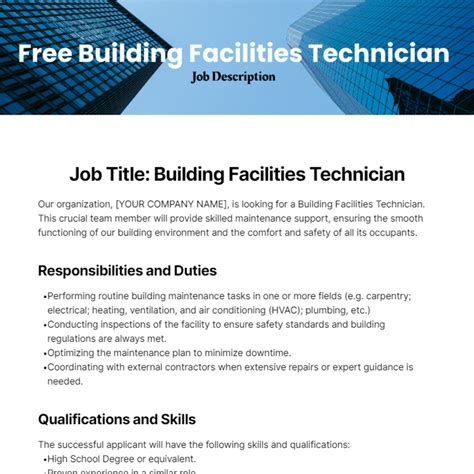Facilities technicians play a crucial role in ensuring the smooth operation of various facilities, including commercial buildings, hospitals, schools, and government institutions. Their primary responsibility is to maintain and repair the physical structures, systems, and equipment of these facilities, thereby creating a safe and comfortable environment for occupants. Here are 7 key responsibilities of a facilities tech job:
The Importance of Facilities Technicians
Before we dive into the key responsibilities of a facilities tech job, it's essential to understand the importance of these professionals. Facilities technicians are the backbone of any organization, as they ensure that the facilities are running efficiently and effectively. Without them, buildings would deteriorate, equipment would malfunction, and occupants would be uncomfortable and unproductive.
The Role of Facilities Technicians in Today's World
In today's fast-paced world, facilities technicians are more important than ever. With the increasing complexity of facilities and the need for sustainable and energy-efficient solutions, the role of facilities technicians has evolved. They must now possess a range of skills, from technical knowledge to communication and problem-solving skills.
Key Responsibilities of a Facilities Tech Job
So, what are the key responsibilities of a facilities tech job? Here are 7 essential duties that facilities technicians perform:
1. Maintenance and Repair

One of the primary responsibilities of a facilities tech job is to perform routine maintenance and repairs on facilities and equipment. This includes tasks such as:
- Inspecting facilities and equipment to identify potential problems
- Performing routine maintenance tasks, such as cleaning and lubricating equipment
- Repairing or replacing faulty or damaged equipment
- Troubleshooting issues and identifying solutions
Types of Maintenance
Facilities technicians perform various types of maintenance, including:
- Preventive maintenance: scheduled maintenance tasks to prevent equipment failures
- Reactive maintenance: repairs and maintenance tasks performed in response to equipment failures
- Predictive maintenance: using data and analytics to predict equipment failures and perform maintenance tasks before they occur
2. Equipment Installation

Facilities technicians are responsible for installing new equipment and systems in facilities. This includes:
- Reading and interpreting installation instructions and diagrams
- Ensuring that equipment is installed correctly and safely
- Testing equipment to ensure that it is functioning properly
Types of Equipment
Facilities technicians install a range of equipment, including:
- HVAC systems
- Electrical systems
- Plumbing systems
- Security systems
3. Troubleshooting

Facilities technicians are responsible for troubleshooting issues with facilities and equipment. This includes:
- Identifying the root cause of problems
- Using diagnostic tools and techniques to troubleshoot issues
- Developing and implementing solutions to problems
Troubleshooting Techniques
Facilities technicians use various troubleshooting techniques, including:
- The "divide and conquer" method: dividing a complex problem into smaller, more manageable parts
- The "symptoms and solutions" method: identifying symptoms and developing solutions to address them
- The "trial and error" method: testing different solutions to identify the most effective one
4. Communication

Effective communication is critical for facilities technicians. They must communicate with various stakeholders, including:
- Building occupants
- Facilities managers
- Contractors and vendors
- Other technicians and maintenance staff
Communication Techniques
Facilities technicians use various communication techniques, including:
- Verbal communication: face-to-face conversations and phone calls
- Written communication: emails, reports, and work orders
- Nonverbal communication: body language and facial expressions
5. Safety and Security

Facilities technicians are responsible for ensuring the safety and security of facilities and occupants. This includes:
- Identifying potential safety hazards and taking steps to mitigate them
- Implementing security measures, such as access control and surveillance systems
- Responding to emergencies and incidents
Safety and Security Protocols
Facilities technicians follow various safety and security protocols, including:
- Lockout/tagout procedures: ensuring that equipment is safely shut down before maintenance or repairs
- Confined space procedures: ensuring safe entry and exit from confined spaces
- Emergency response procedures: responding to fires, spills, and other emergencies
6. Budgeting and Cost Control

Facilities technicians are responsible for managing budgets and controlling costs. This includes:
- Developing and managing maintenance budgets
- Identifying cost-saving opportunities
- Implementing cost-control measures
Cost-Control Techniques
Facilities technicians use various cost-control techniques, including:
- Energy management: reducing energy consumption and costs
- Water management: reducing water consumption and costs
- Waste reduction: reducing waste and implementing recycling programs
7. Training and Development

Finally, facilities technicians are responsible for staying up-to-date with the latest technologies and techniques. This includes:
- Participating in training and development programs
- Attending conferences and workshops
- Reading industry publications and online resources
Training and Development Opportunities
Facilities technicians have various training and development opportunities, including:
- Certification programs: obtaining certifications, such as the Certified Facilities Technician (CFT) designation
- Degree programs: pursuing associate's or bachelor's degrees in facilities management or related fields
- Online courses: taking online courses and training programs to enhance skills and knowledge
Gallery of Facilities Technician Responsibilities






FAQs
What are the key responsibilities of a facilities technician?
+The key responsibilities of a facilities technician include maintenance and repair, equipment installation, troubleshooting, communication, safety and security, budgeting and cost control, and training and development.
What skills do facilities technicians need to possess?
+Facilities technicians need to possess technical knowledge, communication skills, problem-solving skills, and the ability to work independently and as part of a team.
What certifications are available for facilities technicians?
+Facilities technicians can obtain certifications, such as the Certified Facilities Technician (CFT) designation, to demonstrate their expertise and commitment to the profession.
